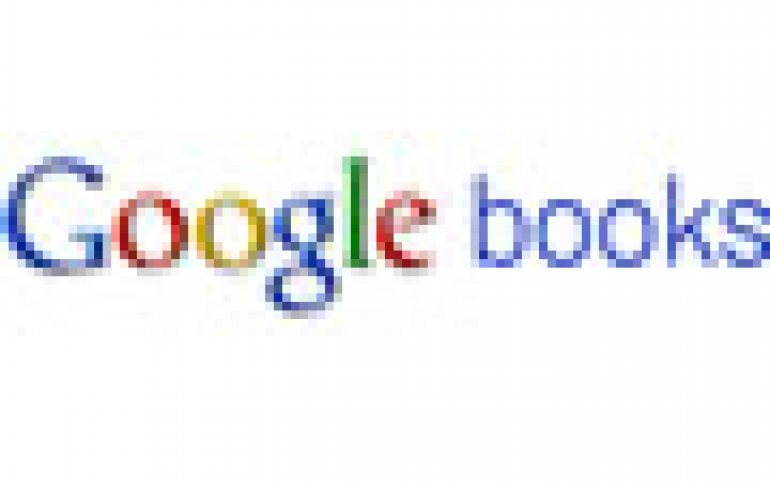
Issues Remain on Amended Google Book Search Settlement, US Justice Department Says
The Department of Justice today said that despite the progress reflected in the proposed amended settlement agreement in The Authors Guild Inc. et al. v. Google, class certification, copyright and antitrust issues remain.
The US Department of Justice advised the U.S. District Court for the Southern District of New York today about the issue.
The department also said that the United States remains committed to working with the parties on issues concerning the scope and content of the settlement.
In its statement of interest filed with the court today, the department stated, "Although the United States believes the parties have approached this effort in good faith and the amended settlement agreement is more circumscribed in its sweep than the original proposed settlement, the amended settlement agreement suffers from the same core problem as the original agreement: it is an attempt to use the class action mechanism to implement forward-looking business arrangements that go far beyond the dispute before the court in this litigation."
On Sept. 18, 2009, the department submitted views to the court on the original proposed settlement agreement. At that time, the department proposed that the parties consider changes to the agreement that might help address the United States' concerns, including imposing limitations on the most open-ended provisions for future licensing, eliminating potential conflicts among class members, providing additional protections for unknown rights holders, addressing the concerns of foreign authors and publishers, eliminating the joint-pricing mechanisms among publishers and authors, and providing a mechanism by which Google?s competitors can gain comparable access.
In today?s filing, the department recognized that the parties made substantial progress on a number of these issues. For example, the proposed amended settlement agreement eliminates certain open-ended provisions that would have allowed Google to engage in certain unspecified future uses, appoints a fiduciary to protect rightsholders of unclaimed works, reduces the number of foreign works in the settlement class, and eliminates the most-favored nation provision that would have guaranteed Google optimal license terms into the future. However, the changes do not fully resolve the United States' concerns. The department also said that the amended settlement agreement still confers significant and possibly anticompetitive advantages on Google as a single entity, thereby enabling the company to be the only competitor in the digital marketplace with the rights to distribute and otherwise exploit a vast array of works in multiple formats.
The department continues to believe that a properly structured settlement agreement in this case offers the potential for important societal benefits. The department stated that it is committed to continuing to work with the parties and other stakeholders to help develop solutions through which copyright holders could allow for digital use of their works by Google and others, whether through legislative or market-based activities.
The settlement agreement between Google and the authors and publishers aims to resolve copyright infringement claims brought against Google by The Authors Guild and five major publishers in 2005 arising from Google's efforts to digitally scan books contained in several libraries and to make them searchable on the Internet. The district court's hearing on the proposed amended settlement agreement is scheduled to take place on Feb. 18, 2010.
In its statement of interest filed with the court today, the department stated, "Although the United States believes the parties have approached this effort in good faith and the amended settlement agreement is more circumscribed in its sweep than the original proposed settlement, the amended settlement agreement suffers from the same core problem as the original agreement: it is an attempt to use the class action mechanism to implement forward-looking business arrangements that go far beyond the dispute before the court in this litigation."
On Sept. 18, 2009, the department submitted views to the court on the original proposed settlement agreement. At that time, the department proposed that the parties consider changes to the agreement that might help address the United States' concerns, including imposing limitations on the most open-ended provisions for future licensing, eliminating potential conflicts among class members, providing additional protections for unknown rights holders, addressing the concerns of foreign authors and publishers, eliminating the joint-pricing mechanisms among publishers and authors, and providing a mechanism by which Google?s competitors can gain comparable access.
In today?s filing, the department recognized that the parties made substantial progress on a number of these issues. For example, the proposed amended settlement agreement eliminates certain open-ended provisions that would have allowed Google to engage in certain unspecified future uses, appoints a fiduciary to protect rightsholders of unclaimed works, reduces the number of foreign works in the settlement class, and eliminates the most-favored nation provision that would have guaranteed Google optimal license terms into the future. However, the changes do not fully resolve the United States' concerns. The department also said that the amended settlement agreement still confers significant and possibly anticompetitive advantages on Google as a single entity, thereby enabling the company to be the only competitor in the digital marketplace with the rights to distribute and otherwise exploit a vast array of works in multiple formats.
The department continues to believe that a properly structured settlement agreement in this case offers the potential for important societal benefits. The department stated that it is committed to continuing to work with the parties and other stakeholders to help develop solutions through which copyright holders could allow for digital use of their works by Google and others, whether through legislative or market-based activities.
The settlement agreement between Google and the authors and publishers aims to resolve copyright infringement claims brought against Google by The Authors Guild and five major publishers in 2005 arising from Google's efforts to digitally scan books contained in several libraries and to make them searchable on the Internet. The district court's hearing on the proposed amended settlement agreement is scheduled to take place on Feb. 18, 2010.




















